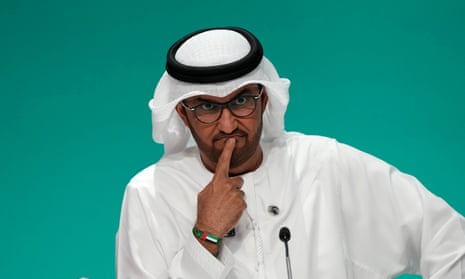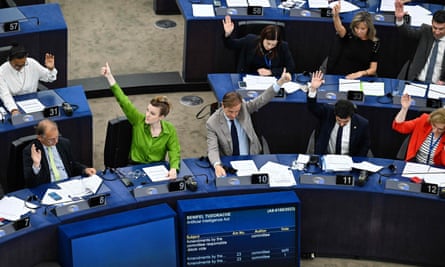Sultan Al Jaber says Cop28 ‘has already made history’ at start of second week
Hello! Helena Horton here taking you through the summit for the rest of the day.
Sultan Al Jaber just held a press conference to kick off week two of Cop28 after a rest day. He told the audience: “I do hope you managed to get some rest yesterday and I hope you are ready for what will be a momentous few days ahead.”
The Cop28 president and oil executive will is likely to be hoping this second half of the summit goes better than the last, when his presidency was undermined by his remarks to Mary Robinson, the former president of Ireland, in which he questioned the science around the phase out of fossil fuels.
He spoke on this theme, insisting this Cop under his leadership is better and more successful than previous summits.
“We can all agree Cop28 has been different, and I am sure we will agree that Cop28 has already made history. There is a unique sense of momentum, a sense of inclusivity and a sense of willingness and flexibility. I also feel a sense that something unprecedented is possible to happen here at Cop28. We achieved consensus on the first day with the loss and damage, and I believe with the momentum we have, with the action-oriented mindset that has been instilled across the board here on the site, I believe we can achieve consensus again on the rest of the agenda.”
No stone unturned: COP28 President Dr Sultan Al Jaber has engaged with all Parties – relevant stakeholders, NGOs, civil society, observers, businesses and industry – to push for the highest possible ambition to ever come out of a COP. #COP28 #UniteActDeliver pic.twitter.com/wmhAhh1QSi
— COP28 UAE (@COP28_UAE) December 8, 2023
Key events
He took some questions from journalists.
-
Agence France-Presse asked if there would be language on coal, oil and gas in the final text of Cop. Sultan Al Jaber, the summit’s president, responded that keeping 1.5 in reach was his “North star” and added: “My job is to keep that North star shining every step of the way.” He said the decision was for those negotiating, and it was his job to “enable and facilitate the process”. Al Jaber added the energy transition must be “pragmatic and results-delivered”. So no real answer on that.
-
The BBC asked how Al Jaber would bring on board those countries reluctant on the issue of fossil fuels, including China, Russia and Saudi Arabia. He said: “I have been engaging with everyone on all parties” including “businesses and industry”. The Cop28 president added: “I did not leave any stone unturned for my commitment for the highest possible ambition ever coming out of a Cop.”
-
The South African Broadcasting Corporation asked about financing for developing countries, saying they will not be able to repay back loans from developed countries. Al Jaber replied: “We cannot only view climate change as a burden, a problem or a challenge. We have to turn that narrative and claim it as an opportunity – it can be seen as a new industrial revolution. .Finance must be made available, accessible and affordable, not only by making pledges but by ensuring that the mechanisms that will allow for those who need it are easy for them to tap into, and ensure the delivery of this money on a timely basis.”
Sultan Al Jaber says Cop28 ‘has already made history’ at start of second week
Hello! Helena Horton here taking you through the summit for the rest of the day.
Sultan Al Jaber just held a press conference to kick off week two of Cop28 after a rest day. He told the audience: “I do hope you managed to get some rest yesterday and I hope you are ready for what will be a momentous few days ahead.”
The Cop28 president and oil executive will is likely to be hoping this second half of the summit goes better than the last, when his presidency was undermined by his remarks to Mary Robinson, the former president of Ireland, in which he questioned the science around the phase out of fossil fuels.
He spoke on this theme, insisting this Cop under his leadership is better and more successful than previous summits.
“We can all agree Cop28 has been different, and I am sure we will agree that Cop28 has already made history. There is a unique sense of momentum, a sense of inclusivity and a sense of willingness and flexibility. I also feel a sense that something unprecedented is possible to happen here at Cop28. We achieved consensus on the first day with the loss and damage, and I believe with the momentum we have, with the action-oriented mindset that has been instilled across the board here on the site, I believe we can achieve consensus again on the rest of the agenda.”
No stone unturned: COP28 President Dr Sultan Al Jaber has engaged with all Parties – relevant stakeholders, NGOs, civil society, observers, businesses and industry – to push for the highest possible ambition to ever come out of a COP. #COP28 #UniteActDeliver pic.twitter.com/wmhAhh1QSi
— COP28 UAE (@COP28_UAE) December 8, 2023
Summary
Cop28 is getting back up to speed after its enforced – but much needed – rest day yesterday, with attention focusing on debate about whether to agree to phase out or phase down fossil fuels.
So far today we have had:
Christiana Figueres, the UN’s climate chief when the landmark Paris agreement was reached in 2015, come out unequivocally behind a phase out of fossil fuels. “If we want a step forward in this Cop, then we cannot compromise on phase out. It sends a political signal that has ramifications for companies that need to decide where they’re going to put their (investment).”
Research from the Food and Agricultural Organisation that reveals the huge impact of livestock emissions on the climate. It found that livestock agrifood systems – which include cattle, buffaloes, sheep, goats, pigs and chickens – are responsible for 6.2 gigatonnesof carbon dioxide equivalent emissions, approximately 12% of all emissions in 2015.
One hundred global Native groups and allies have published an open letter calling for Cop28 negotiators to protect of Indigenous rights during the clean energy transition.
More than 250 organisations from across the world have released a letter calling on the US to abandon its support for liquefied natural gas ,which is due to grow massively in the next few years.
Australia’s climate change minister, Chris Bowen, has pledged of AUS$150m (US$100m) in climate finance, mainly targeted at Pacific countries
Azerbaijan appears to be emerging as a favourite to hold next year’s Cop
I am now going to hand over to my colleague Helena Horton ([email protected]), who will be seeing the blog through to the end of the day.

Fiona Harvey
Research published on Friday by the Food and Agricultural Organisation (FAO) at Cop28 reveals the huge impact of livestock emissions on the climate. Livestock produce methane, a greenhouse gas 80 times more powerful than carbon dioxide, so are a key contributor to the climate crisis.
The FAO found that livestock agrifood systems – which include cattle, buffaloes, sheep, goats, pigs and chickens – are responsible for 6.2 gigatonnes (Gt) of carbon dioxide equivalent (CO2eq) emissions.
This accounts for approximately 12% of all emissions in 2015, the baseline year chosen for the study.
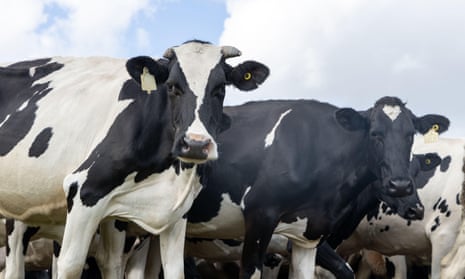
It also found:
Of all the six animal species considered, cattle contribute to more than 60% of global livestock emissions.
Of the edible animal products – meat, milk and eggs – two-thirds of the emissions are linked to meat production across all species.
A further one-third of emissions comes from the production, processing and transport of feed inputs.
By 2050, demand for animal products is likely to grow by a fifth from 2020 levels
Without intervention, this upward trend could result in increased emissions from livestock systems, potentially undermining efforts to reduce GHG emissions and exacerbating global temperature rises.
The FAO concludes that more sustainable practices are needed, including breeding livestock for lower emissions and changing their feed, as well as changing human diets.
The report included some data that will trouble campaigners. Cattle in sub-Saharan Africa produce relatively far more emissions than North American cattle, according to the study, although most conservationists would regard subsistence herding as more acceptable environmentally than the mega farms of the US midwest.
The report notes that the absolute emissions of US intensive livestock farming are far greater than those of African herds, but said there was scope for interventions in Africa that would reduce emissions.
Campaigners will not want to see the US given a clean sheet and subsistence farmers taking the blame – that would be the wrong conclusion to draw from their data.
FAO will also present, separately, on Sunday a road map for the world food systems for staying within 1.5C .
Ivo Vlaev, a professor of behavioural science at Warwick Business School at the University of Warwick, said: “Shifting public dietary habits, especially in affluent countries where meat consumption is high, is a complex challenge. People’s food choices are deeply ingrained and influenced by cultural, social, and personal factors.
“Interventions to change these behaviours must account for these influences, potentially employing strategies like social norming (highlighting the growing popularity of plant-based diets), framing (emphasising the personal health benefits of reduced meat consumption), and facilitating ease of access to alternative protein sources.”
As mentioned earlier, today’s focus at Cop is officially on youth and children and there have been several protests calling for more progress on adaptation and financial to support poorer countries on the frontline of the climate crisis.
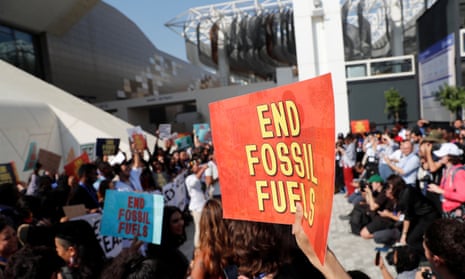
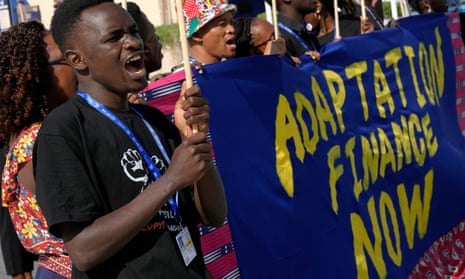
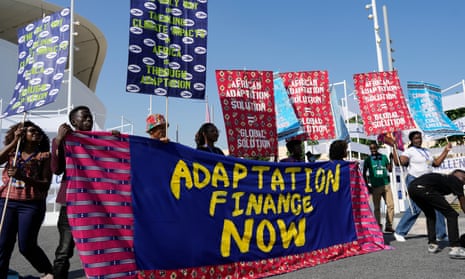
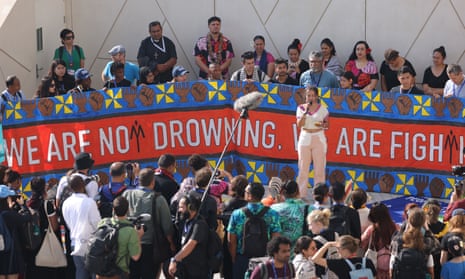

Damian Carrington
Mystery of Sultan Al Jaber’s ‘identical’ words
In Monday’s combative press conference, in which the Cop28 president, Sultan Al Jaber, responded to the Guardian revelation that he had said there was “no science out there that says that the phase-out of fossil fuel is what’s going to achieve 1.5C”, a journalist raised the issue of a powerful, and apparently contradictory, statement made by the UN secretary general, António Guterres, a few days before.
“The secretary general has said just, here a few days ago, don’t even talk abated,” the reporter from Associated Press said. Guterres had said: “The science is clear: The 1.5C limit is only possible if we ultimately stop burning all fossil fuels. Not reduce, not abate. Phase out, with a clear timeframe.”
Al Jaber responded: “I’m glad you mentioned what (secretary general’) said. He’s right. But guess what? I said it a day before he did – it wasn’t picked up, not even mentioned.”
Al Jaber said he had confronted the oil and gas industry, brought them around the table and got them to sign up to commitments, apparently referring to the oil and gas decarbonisation charter announced at Cop28.
“Actually, let me just be simple. I said the same thing. I was identical. Same thing, no pick up whatsoever. The (secretary general) gets maximum coverage,” he said.
Immediately after the press conference, the Guardian asked the Cop28 press office what the “identical” comments were and when Al Jaber had made them. Despite repeating the request since, no answer has been received.

Damian Carrington
With calls for a phase out instead of a phase down of fossil fuels shaping up to be the critical fight in the second week of Cop28, Christiana Figueres, the UN’s climate chief when the landmark Paris agreement was reached in 2015, is unequivocally behind a phase-out.
“If we want a step forward in this Cop, then we cannot compromise on phase out,” said Figueres, the founder of the Global Optimism group. “It sends a political signal that has ramifications for companies that need to decide where they are going to put their (investment).”
She said including further language around phase-out would take into consideration other concerns. “Language around equity is important, because industrialised countries can and should phase out much quicker than developing countries who are exporters (and) language around a just transition is critical.” Figueres said at a Guardian Live event on Wednesday.
Tessa Khan, a lawyer and founder of the Uplift campaign group in the UK, said: “The signal that softer language – phase down – sends is suggesting a longer lifetime for fossil fuel demand and production.
“That’s a dangerous signal to send national governments, to investors, to companies that are right now really at a crossroads in terms of whether or not they do invest in new fossil fuel supply, or how quickly they transition their economies away from fossil fuels.”

Adam Morton
The vexed question of where Cop will be held next year may be a step closer to resolution.
As has been previously reported, it is eastern Europe’s turn to host Cop29 but Russia has vetoed the 27 EU countries and, until recently, Armenia and Azerbaijan have been vetoing each other. That left only seven, mostly small states, as possible hosts under the UN consensus model. And organising a Cop is highly expensive.
The picture changed on Thursday night after the governments of Armenia and Azerbaijan, which have been at odds for decades, issued a joint statement saying they were taking steps to “normalise” their relationship. They included releasing captured soldiers and Armenia dropping its Cop bid and throwing its support behind Azerbaijan.
“The Republic of Armenia and the Republic of Azerbaijan do hope that the other countries within the eastern European group will also support Azerbaijan’s bid to host,” the statement said.
This is not guaranteed. Moldova has also put itself forward as a candidate, and Reuters reports that Serbia is considering a bid.
It remains possible that Bonn, the home of the UN climate secretariat, or a larger German city could become the default location if agreement is not reached.
Australia’s climate change minister, Chris Bowen, does not have a say in the decision but has been watching from a distance, as the delay over next year has held up discussion of where Cop31 will be held in 2026. Australia had made a bid to co-host with Pacific countries.
Asked about the Azerbaijan-Armenia statement, Bowen said “there does appear to have been a breakthrough” on where Cop29 would be held and that was “welcome”.
Asked if he was surprised, he said: “Yeah, well, a little. But the fact that Azerbaijan and Armenia, through the purposes of a Cop … strike a reached agreement does give you some reminder that there’s cause for a little bit of hope in the world.”

Patrick Greenfield
Mary Robinson has arrived at Cop28 just days after her exchange with the Cop28 president, Sultan Al Jaber, over the role of fossil fuels in limiting global heating to 1.5C caused controversy at the climate summit.
In a picture near the Blue Zone entrance, the former president of Ireland reiterated the need to phase out fossil fuels to meet the target.
“Countries must do more than offer superficial pledges. We need radical collaboration to ensure an ambitious response plan to the Global Stocktake. To protect the 1.5°C warming limit this requires a phase out of all fossil fuels,” she said on X.
Earlier this week, Al Jaber was forced into a fierce defence of his views on climate science, after the Guardian revealed his comment that there was “no science out there, or no scenario out there, that says that the phase-out of fossil fuel is what’s going to achieve 1.5C”.
Mary Robinson arrives at #COP28.
“Countries must do more than offer superficial pledges. We need radical collaboration to ensure an ambitious response plan to the Global Stocktake. To protect the 1.5°C warming limit this requires a phase out of all fossil fuels.” pic.twitter.com/ThxkFZbpjx
— The Elders (@TheElders) December 8, 2023
100 global Native groups call for negotiatiors to protect Indigenous rights during clean energy transition
Dharna Noor
One hundred global Native groups and allies published an open letter on Thursday calling for Cop28 negotiators to protect Indigenous rights during the clean energy transition.
The letter, signed by dozens of Indigenous-led organisations as well as environmental advocacy groups such as Earthjustice and anti-poverty groups including Oxfam, urged delegates to fight for policies that would require the consent of Indigenous communities before their ancestral lands could be mined.
“We have ancestral, cultural, and spiritual ties to our lands that not only require our participation in climate advocacy but also call us to commit to the proper stewardship practices of nature that are deeply rooted in our ways of life,” it says.
Native people, the letter asserts, are among the global leaders in demanding the phase-out of fossil fuels, but without proper safeguards, that transition could put those communities at risk.
Clean energy products such as solar panels, wind turbines and batteries for energy storage and electric vehicles require far more minerals to produce than their fossil fuel-powered counterparts. A 2022 study found that 54% of deposits of minerals needed in the global energy transition – including lithium, copper, nickel, and others – are on or near the land of Indigenous people.
The letter demands that officials recognise the rights of Native communities to have input on decisions about mining projects on those lands, including by protecting the right to free, prior, and informed consent as outlined in previous UN agreements.
Oil, gas and mining companies have long exploited Indigenous people and land, the letter says, but at Cop28, officials have an opportunity to “define a better and more inclusive world that serves all communities and all peoples”.
Cop28 president to give press conference about ministerial pairings as negotiations enter new stage

Patrick Greenfield
The Cop28 president Sultan Al Jaber will soon give a press conference here in Dubai about the ministerial pairings at Cop28, a sign that negotiations are entering an important new stage.
Every climate summit, an environment minister from the Global North and Global South are paired together to oversee talks on key subjects to help reach consensus for the final text.
This process beings when talks with government official have gone as far as they can and ministers need to begin making compromises to reach a final political agreement. The UAE presidency, led by Sultan Al Jaber, will then be responsible for bringing it all together.
At Cop28, language on phasing out fossil fuels is likely to be a key point of division, as will the text climate change adaption which is seen as a crucial issue in the developing world.
Carbon Brief’s Daisy Dunne has this year’s ministerial pairings.
NEW: Minister pairings for crucial phase of #COP28 negotiations have been announced
Global Stocktake: South Africa🇿🇦 & Denmark🇩🇰 – (🇩🇰 leads @beyondoilgas group of countries pushing for all fossil fuels to be phased out)
Mitigation: Singapore🇸🇬 & Norway🇳🇴
(1/2)
— Daisy Dunne (@daisydunnesci) December 8, 2023
Adaptation: Chile🇨🇱 & Australia🇦🇺
Means of implementation: Egypt🇪🇬 & Canada🇨🇦
(Press briefing from them shortly, at 12:30pm Dubai time!)
— Daisy Dunne (@daisydunnesci) December 8, 2023
Interesting bit from COP28 presdiency:
“For the first time, the COP28 Presidency started the Ministerial Pair engagement early; and over the past six months they have worked closely with the Presidency and Parties.”
— Daisy Dunne (@daisydunnesci) December 8, 2023
Separately, an informal group of ministers is also being consulted by the presidency on the role of fossil fuels in the final agreement which includes the Canadian environment minister. Others are understood to have been asked for input.

Patrick Greenfield
More from my colleague Patrick Greenfield on Canada’s role over the coming days.
The Cop28 president, Sultan Al Jaber, has congratulated Canada on the country’s plans to require its fossil fuel industry to reduce greenhouse gas emissions, which have inspired a must-have fashion accessory at Cop28.
Earlier this week, the oil and gas chief was forced into a fierce defence of his views on climate science, after the Guardian revealed his comment that there was “no science out there, or no scenario out there, that says that the phase-out of fossil fuel is what’s going to achieve 1.5C”.
On Thursday, Al Jaber praised Canada’s decision to force its fossil industry into cuts of between 35-38% below 2019 levels, starting in 2030, and said the decarbonisation of all heavy emitting industries was a top priority.
“(Thursday)’s news that Canada plans to cap pollution from the oil and gas industry is an important step on their decarbonisation journey, and I applaud Canada for their decision,” Al Jaber said.
“Cop28 is focused on raising ambition and delivering practical action that will help reduce emissions by 43% by 2030, to keep 1.5C within reach. We have made the decarbonisation of all heavy-emitting industries a top priority and are engaging with countries and companies to triple renewables, double energy efficiency, reduce methane, and scale hydrogen.
“We continue to call on all oil and gas companies to sign onto the Cop28 oil and gas decarbonisation charter, which requires companies to end routine flaring and methane emissions by 2030 and align on a path to net zero at or before 2050. And we will continue to push for more.”
Canada’s emission cap policy has also become a must-have fashion accessory in Dubai.


